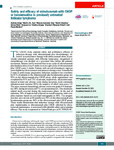Safety and efficacy of obinutuzumab with CHOP or bendamustine in previously untreated follicular lymphoma
| dc.contributor.author | Grigg, A | |
| dc.contributor.author | Dyer, MJS | |
| dc.contributor.author | Díaz, MG | |
| dc.contributor.author | Dreyling, M | |
| dc.contributor.author | Rule, Simon | |
| dc.contributor.author | Lei, G | |
| dc.contributor.author | Knapp, A | |
| dc.contributor.author | Wassner-Fritsch, E | |
| dc.contributor.author | Marlton, P | |
| dc.date.accessioned | 2017-08-11T10:16:30Z | |
| dc.date.available | 2017-08-11T10:16:30Z | |
| dc.date.issued | 2017-04 | |
| dc.identifier.issn | 0390-6078 | |
| dc.identifier.issn | 1592-8721 | |
| dc.identifier.uri | http://hdl.handle.net/10026.1/9774 | |
| dc.description.abstract |
The GAUDI study assessed safety and preliminary efficacy of induction therapy with obinutuzumab plus chemotherapy, followed by maintenance therapy with obinutuzumab alone, in previously untreated patients with follicular lymphoma. Assignment to chemotherapy was decided on a per-center basis before the patients' enrollment. Patients (n=81) received four to six cycles of obinutuzumab plus bendamustine every 4 weeks or six to eight cycles of obinutuzumab plus CHOP every 3 weeks. Patients with an end-of-treatment response were eligible for obinutuzumab maintenance therapy every 3 months for 2 years or until disease progression. Induction treatment was completed by 90% of patients in the obinutuzumab plus bendamustine group and 95% in the obinutuzumab plus CHOP group, while maintenance was completed by 81% and 72% of patients, respectively. All patients experienced at least one adverse event during induction, most commonly infusion-related reactions (58%), the majority of which were grade 1/2. The most common hematologic adverse event was grade 3/4 neutropenia (36% during induction and 7% during maintenance). One treatment-related death occurred during the maintenance phase. At the end of induction, 94% of patients had achieved an overall response, with complete response based on computed tomography in 36%. The progression-free survival rate at 36 months was 90% in the obinutuzumab plus bendamustine group and 84% in the obinutuzumab plus CHOP group. These results demonstrate that induction therapy with obinutuzumab plus bendamustine or obinutuzumab plus CHOP, followed by obinutuzumab maintenance, is associated with tolerable safety and promising efficacy. This study is registered at ClinicalTrials.gov as NCT00825149. | |
| dc.format.extent | 765-772 | |
| dc.format.medium | Print-Electronic | |
| dc.language | en | |
| dc.language.iso | en | |
| dc.publisher | Ferrata Storti Foundation (Haematologica) | |
| dc.subject | Adult | |
| dc.subject | Aged | |
| dc.subject | Antibodies, Monoclonal, Humanized | |
| dc.subject | Antineoplastic Combined Chemotherapy Protocols | |
| dc.subject | Bendamustine Hydrochloride | |
| dc.subject | Cyclophosphamide | |
| dc.subject | Doxorubicin | |
| dc.subject | Drug Monitoring | |
| dc.subject | Female | |
| dc.subject | Follow-Up Studies | |
| dc.subject | Humans | |
| dc.subject | Induction Chemotherapy | |
| dc.subject | Lymphoma, Follicular | |
| dc.subject | Maintenance Chemotherapy | |
| dc.subject | Male | |
| dc.subject | Middle Aged | |
| dc.subject | Neoplasm Metastasis | |
| dc.subject | Neoplasm Staging | |
| dc.subject | Prednisone | |
| dc.subject | Survival Analysis | |
| dc.subject | Treatment Outcome | |
| dc.subject | Tumor Burden | |
| dc.subject | Vincristine | |
| dc.title | Safety and efficacy of obinutuzumab with CHOP or bendamustine in previously untreated follicular lymphoma | |
| dc.type | journal-article | |
| dc.type | Journal Article | |
| dc.type | Research Support, Non-U.S. Gov't | |
| plymouth.author-url | https://www.webofscience.com/api/gateway?GWVersion=2&SrcApp=PARTNER_APP&SrcAuth=LinksAMR&KeyUT=WOS:000402488900028&DestLinkType=FullRecord&DestApp=ALL_WOS&UsrCustomerID=11bb513d99f797142bcfeffcc58ea008 | |
| plymouth.issue | 4 | |
| plymouth.volume | 102 | |
| plymouth.publication-status | Published | |
| plymouth.journal | Haematologica | |
| dc.identifier.doi | 10.3324/haematol.2016.152272 | |
| plymouth.organisational-group | /Plymouth | |
| plymouth.organisational-group | /Plymouth/Faculty of Health | |
| plymouth.organisational-group | /Plymouth/Faculty of Health/Peninsula Medical School | |
| plymouth.organisational-group | /Plymouth/REF 2021 Researchers by UoA | |
| plymouth.organisational-group | /Plymouth/REF 2021 Researchers by UoA/UoA01 Clinical Medicine | |
| plymouth.organisational-group | /Plymouth/REF 2021 Researchers by UoA/UoA01 Clinical Medicine/UoA01 Clinical Medicine | |
| plymouth.organisational-group | /Plymouth/Research Groups | |
| plymouth.organisational-group | /Plymouth/Research Groups/Institute of Translational and Stratified Medicine (ITSMED) | |
| plymouth.organisational-group | /Plymouth/Research Groups/Institute of Translational and Stratified Medicine (ITSMED)/CBR | |
| plymouth.organisational-group | /Plymouth/Research Groups/Institute of Translational and Stratified Medicine (ITSMED)/CCT&PS | |
| plymouth.organisational-group | /Plymouth/Users by role | |
| plymouth.organisational-group | /Plymouth/Users by role/Academics | |
| dc.publisher.place | Italy | |
| dcterms.dateAccepted | 2016-12-22 | |
| dc.identifier.eissn | 1592-8721 | |
| dc.rights.embargoperiod | No embargo | |
| rioxxterms.versionofrecord | 10.3324/haematol.2016.152272 | |
| rioxxterms.licenseref.uri | http://www.rioxx.net/licenses/all-rights-reserved | |
| rioxxterms.licenseref.startdate | 2017-04 | |
| rioxxterms.type | Journal Article/Review | |
| plymouth.oa-location | http://www.haematologica.org/content/102/4/765 |


